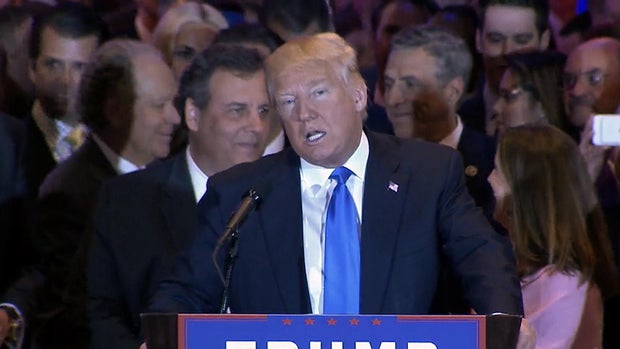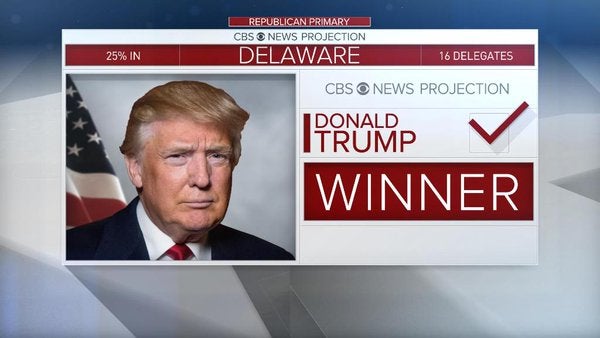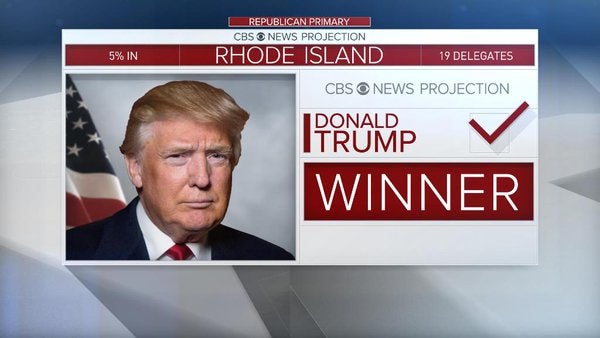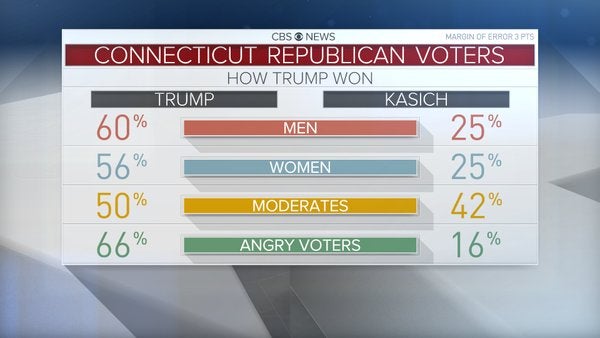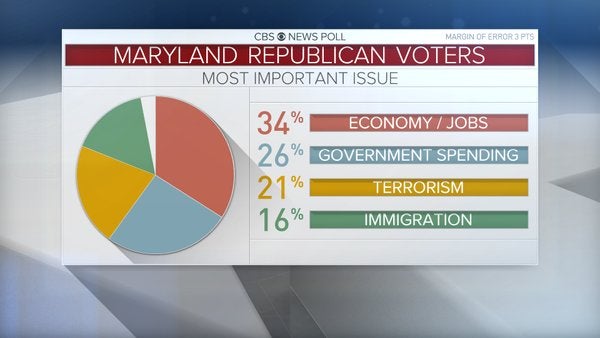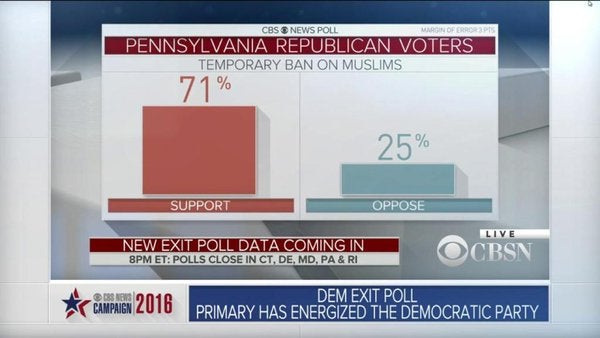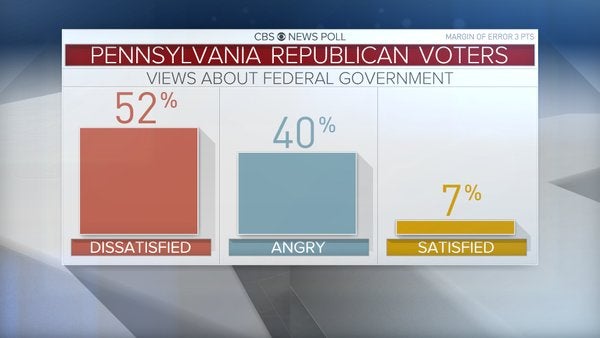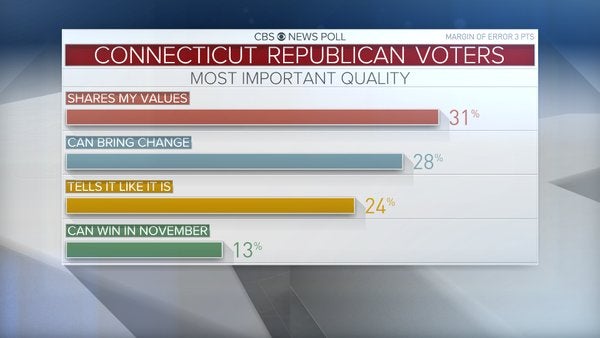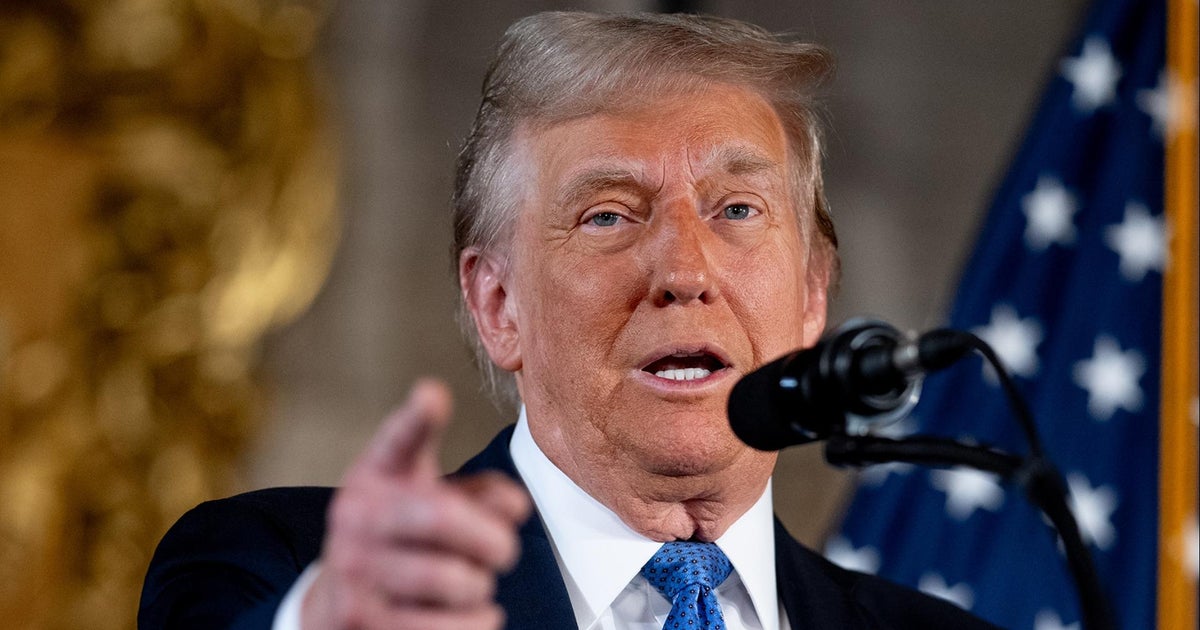Donald Trump easily sweeps Northeastern primaries
10:15 p.m. ET
"I consider myself the presumptive nominee, absolutely," Trump said in New York City after his five victories Tuesday night. "Sen. Cruz and Gov. Kasich should really get out of the race. They have no path to victory."
9:25 p.m. ET
It is now not numerically possible for Ted Cruz to clinch the Republican nomination with 1,237 delegates, according to CBS calculations. Here's what Donald Trump had to say on Tuesday evening about his opponents:
9:05 p.m. ET
More from CBS News exit polling from Maryland:
Trump won the Maryland Republican primary with strong support from men, older voters, and those without a college degree.
Trump won 57 percent of men's votes and 47 percent among women. He still ran well ahead of both Kasich (26 percent) and Cruz (24 percent) among women.
He won 55 percent of the vote among those over 45 and 47 percent among those under 45. Six out of 10 of Republicans without a college degree supported him, as did 47 percent of those with a college degree.
Trump won a majority of votes among evangelical Christians and those Republicans who consider themselves very conservative.
Cruz got 36 percent of the votes of the very conservative Republicans and only 24 percent of evangelical Christians.
Kasich's main sources of support were Republicans who consider themselves to be ideological moderate, the most affluent voters, and the most educated.
8:35 p.m. ET
Donald Trump is the winner of the Delaware primary, CBS News projects, giving the front-runner a clean sweep of the evening.
8:27 p.m. ET
Donald Trump has won the Rhode Island Republican primary, CBS News projects.
8:25 p.m. ET
More specifically from the CBS News exit poll out of Connecticut, where Trump won with very broad support:
Trump did almost as well among women (54 percent) as men (59 percent). He won a majority of votes of those under and over 45.
As in previous contests, Trump does better among Republican voters without a college degree, but he still got half the voter of those with college degrees and 44 percent of the votes of those with postgraduate degrees.
Trump won at least half the votes of those across the political spectrum -- voters who consider themselves very conservative, somewhat conservative, and moderate Republicans.
Kasich's major support came from more affluent voters, those with college and postgraduate degrees, and voters who consider themselves moderate. Over 40 percent of those who voted for him said that they were mainly voting against his opponents.
As was the case in New York last week, Cruz did not run as strongly as he needed to among the groups that should be his strongest supporters -- those who consider themselves to be very conservative and evangelical Christians. Trump won 50 percent of the very conservative voters and 60 percent of evangelical Christians. Four in 10 Connecticut primary voters said that they would not vote for Cruz in November if he were the Republican nominee.
Forty-five percent of Kasich supporters said they wouldn't vote for Cruz in November if he were the Republican nominee
8:20 p.m. ET
More from the exit polling from Pennsylvania, Connecticut and Maryland:
About four in 10 voters in each state said they were angry about the way things are going in Washington, and these voters went largely for Trump.
It's not just anger at the government. Sixty-one percent of Pennsylvania Republicans said they feel betrayed by the politicians from the Republican Party - among the highest we've seen in the primaries so far. Trump won six in 10 of those who feel betrayed by the Republican Party. But he also won the support of those who don't.
Also in Pennsylvania, most Republican voters say this campaign has divided their party (57 percent), but Trump and non-Trump voters see it differently: More than half of Trump voters in Pennsylvania say the campaign has energized the Republican Party, but 79 percent of non-Trump voters think this campaign has created division in the party.
Across the three states, majorities of Republican primary voters say that if no candidate has a majority of delegates before the convention this summer, the candidate with the most votes should get the nomination. Trump has the most votes and most delegates of any candidate so far, and his supporters are especially likely to think the candidate with most votes should be the nominee. In Pennsylvania, about 90 percent of his supporters say that, while more than half of Cruz and Kasich voters think the delegates at the convention should pick the candidate they think is best at the convention.
The economy and jobs was the top issue in these three states, and Trump won the voters who picked it. And Trump was the top choice among voters who want a candidate who will bring needed change.
8 p.m. ET
Front-runner Donald Trump has won the Republican primaries in Pennsylvania, Connecticut, Maryland, CBS News projects.
Republicans Delaware and Rhode Island also voted on Tuesday, but there is no exit polling in those two states.
Speaking to CBS News' Vladimir Duthiers at the Time 100 gala in New York City just before 8 p.m. ET, Trump said that Ted Cruz and John Kasich should drop out because they have "no way" of getting to 1,237 delegates.
"They really should drop out of the race," he said. "I'm millions of votes ahead, I'm hundreds of delegates ahead."
In the three states where CBS News exit polling was conducted, Trump is winning support across many demographic groups. He is winning the support of both men and women. In each of the three states, he is getting the backing of six in 10 of those without a college degree. He also performs well among college-educated Republicans.
Trump continues to get the support of who are angry about the way things are going in Washington. This is the case in all three states.
When Pennsylvania voters were asked whether they would vote for each of the three candidates if they were the nominee, 37 percent say they would not vote for Cruz in a general election. Republican voters in the state also express more concern about Cruz being elected president than they do about Kasich or Trump.
7:27 p.m. ET
Here's a look at what issues matter the most to Maryland Republicans:
6:40 p.m. ET
Below is a closer look at some of the exit polling out of Pennsylvania, where a total of 71 delegates are at stake. Seventeen delegates are winner-take-all, but as many as 54 are unbound. This means those 54 -- three from each congressional district -- can vote for whomever they want. Many of those delegates say they'll back whoever wins his or her district, which bodes well for Trump.
6:15 p.m. ET
A closer look at the qualities that Connecticut Republican voters are looking for:
5:25 p.m. ET
In Pennsylvania, about six in 10 looking for an outsider as the next president rather than someone with political experience.
Majorities across the three states where exit polls were conducted say if no candidate gets a majority of delegates ahead of the convention, the candidate with the most votes should be the nominee. Among Trump supporters in Pennsylvania, this figure rises to more than 90 percent.
More than half of Pennsylvania voters not backing Trump think the delegates should choose who they think is best.
In Pennsylvania, six in 10 Republican voters say the campaign has divided their party, rather than energized it. Also in Pennsylvania, 61 percent of Republican voters say they feel betrayed by the Republican party, among the highest so far this primary season.
5:05 p.m. ET
Republican voters in five states -- Connecticut, Delaware, Maryland, Pennsylvania, Rhode Island -- are casting their ballots in the 2016 primary Tuesday, choosing from Donald Trump, Ted Cruz or John Kasich. Trump is expected to do very well, and a strong night for the front-runner would keep him on track to eventually reach the 1,237 delegates needed to win the GOP nomination outright.
Polls close in all five states at 8 p.m. ET.
The economy it the top issue for Republican voters in three states where exit polls were conducted -- Pennsylvania, Connecticut, and Maryland. As many as 44 percent of voters in Connecticut cited the economy as their top issue, as did 34 percent of Maryland voters and 38 percent of Pennsylvania voters.
- The Northeast primaries: 4 things to watch for
- Poll: Trump, Clinton could struggle to unite respective parties
About a quarter of voters in all three states said government spending was the most important issue. Twenty-four percent of voters in Pennsylvania named terrorism, while slightly fewer chose that topic in Connecticut and Maryland.
In Maryland and Connecticut, more GOP voters say Wall Street helps the economy rather than hurts it, but more Pennsylvania Republicans think Wall Street hurts the economy.
Sharing values and bringing needed change are the candidate qualities that mattered most to Republican primary voters today -- 31 percent of Connecticut voters called it the most important candidate quality, as did 33 percent of Maryland voters and 29 percent of Pennsylvania voters. In Pennsylvania, slightly more voters (35 percent) said they were primarily looking for a candidate who can bring about change. In Connecticut, 28 percent said they were looking for a candidate who can bring about change, as did 30 percent of voters in Maryland.
As we've seen in earlier primaries, most Republican primary voters are unhappy with the way the federal government is working, including many who are angry. Forty-five percent in Connect are angry, as are 38 percent in Maryland and 40 percent in Pennsylvania.
